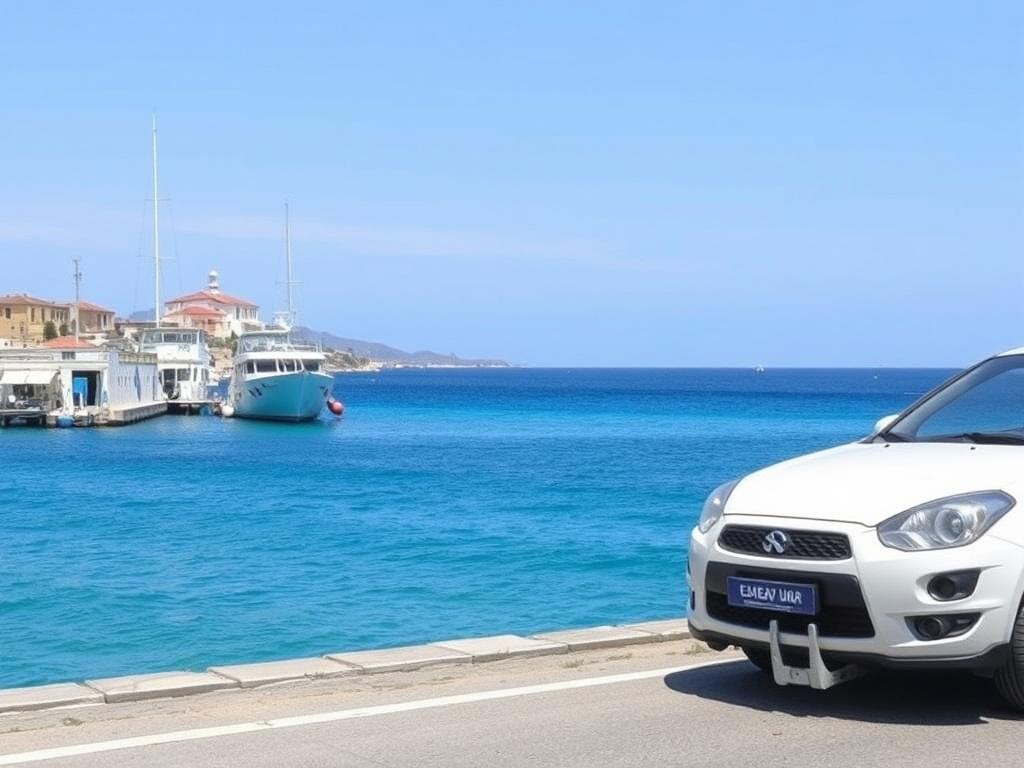If you’re planning a move to the Mediterranean and considering citizenship in Cyprus, understanding how to import your car duty free is an essential part of settling smoothly. Cyprus, with its appealing climate and lifestyle, attracts many retirees who want their own vehicle to navigate the island’s unique roads. Yet, the rules around moving to Cyprus car rules, specifically for vehicle importation and registration, can seem complex at first glance. This detailed guide will walk you through every step of importing a vehicle duty free as a retiree in Cyprus, clearing up common questions and ensuring your transition is hassle-free.
Overview of Importing a Car to Cyprus as a Retiree
When retiring to Cyprus, the thought of bringing your own car along is common, and rightly so: your trusted vehicle offers independence and comfort. However, Cyprus has strict regulations concerning vehicle imports, especially for Cyprus retirees aiming to bring a vehicle duty free. This policy exists mainly to prevent commercial imports and encourage residents to purchase vehicles locally while still offering concessions for those truly relocating.
To qualify for duty-free vehicle Cyprus import benefits as a retiree, you must demonstrate genuine residential commitment and meet specific ownership and residency requirements. Without satisfying these, you’ll face regular import taxes and VAT, which can substantially increase the cost of bringing your vehicle.
Retiring to Cyprus offers a great opportunity to import your car duty free—but only if you meet strict residency and ownership conditions.
Understanding Eligibility: Who Qualifies for Duty-Free Vehicle Import in Cyprus?
The key to importing your car duty free lies in eligibility criteria set by Cyprus Customs and related government authorities. It’s not simply a matter of declaring retirement; the island requires a demonstrable connection to Cyprus life.
Here are the main eligibility conditions for retirees:
- Proof of permanent residency or intent to reside in Cyprus on a long-term basis.
- Ownership of the vehicle for at least six months prior to application.
- A non-commercial reason for import—vehicles not meant for resale or business.
- Importation must take place within 12 months of establishing residency.
- Applicants must not have previously imported a vehicle duty-free.
Importantly, retirees who have acquired citizenship in Cyprus or hold long-term residency permits fall into the category of qualifying applicants. This makes the link between establishing roots and enjoying the duty-free vehicle Cyprus benefits clear.
Eligibility hinges on both proof of residency and prior ownership of the vehicle—without these, duty-free status won’t apply.
Step-by-Step Process of Importing a Car to Cyprus
Importing your vehicle after deciding to retire in Cyprus involves a series of structured steps. Knowing what comes next will help you avoid costly mistakes or delays.
1. Establish Residency in Cyprus
This often means registering your new address, applying for a residence permit, or obtaining citizenship in Cyprus. Without this step, importing your car duty-free is impossible.
2. Prepare Documentation
Gather all necessary papers such as:
- Proof of vehicle ownership (original registration documents).
- Identification documents proving your residency status.
- Evidence of living in Cyprus or retirement intention, including lease agreements or property deeds.
- Previous vehicle registration documents from your country of origin.
3. Notify Cyprus Customs
You must declare your intent to bring the vehicle duty free upon arrival or beforehand. Be ready to show that the car is for personal use and that you meet the set criteria.
4. Inspection and Tax Exemption
The vehicle will undergo inspection by customs to confirm condition and identity. Upon approval, duty exemptions are applied.
5. Register Your Car in Cyprus
Once imported, the vehicle must be registered locally. This involves passing road safety checks, paying registration fees, and obtaining Cypriot number plates.
Each stage in the import process demands thorough documentation and strict adherence to residency proof requirements.
Navigating Car Registration for Cyprus Retirees
Registration is the final hurdle after importing your car duty free. The Cypriot system demands specific checks and validations to allow your vehicle on the road legally.
First, you need to present your customs clearance paperwork, confirming the duty-free import status to the Department of Road Transport. Then the vehicle must pass a technical inspection to certify roadworthiness. The government charges a registration fee based on the vehicle type, engine size, and age.
After those steps are complete, you’ll receive Cypriot license plates and road tax documents. The whole process can take several weeks, so it’s advisable to begin registration as soon as customs clearance is obtained.
Proper registration ensures your car can be used legally without unforeseen interruptions or fines.
Understanding the Specific Moving to Cyprus Car Rules
Cyprus driving and import regulations differ from many mainland European countries or other global regions. Retirees moving here should become familiar with these rules early.
Key automotive laws include driving on the left side of the road, limits on vehicle age for import, and mandatory insurance coverage. Vehicles older than 12 years face restrictions or require special inspections. Additionally, emissions standards must be met according to Cypriot law, which aligns largely with European directives.
Local enforcement of traffic regulations can be strict, especially regarding parking and speed limits. Retirees are advised to obtain an International Driving Permit and familiarize themselves with local driving customs.
Understanding and adapting to Cyprus road rules is crucial for a smooth driving experience after your duty-free car import.
Financial Considerations with Duty-Free Vehicle Import in Cyprus
Importing a car duty free saves significant money on taxes and VAT. Without the duty-free status, taxes can reach 20-30% or more of the vehicle’s value, along with import fees. However, there are still costs involved even with duty exemptions.
These include:
| Cost Item | Description |
|---|---|
| Registration Fees | Fixed and variable fees based on vehicle specifications |
| Vehicle Inspection Costs | Mandatory technical and safety checks |
| Road Tax | Annual fee determined by engine capacity |
| Insurance | Compulsory motor insurance for legal driving |
Careful budgeting for these expenses will help retirees avoid surprises and plan their transition effectively.
Duty-free import lowers tax burdens but doesn’t remove all costs—planning for registration and upkeep fees is vital.
Common Challenges and How to Avoid Them
Many retirees underestimate the complexity involved in importing and registering a car in Cyprus. Some of the frequent issues include:
- Insufficient documentation proving residency or ownership.
- Delay or failure in customs clearance due to missing paperwork.
- Non-compliance with vehicle age or emissions standards causing rejection.
- Misunderstanding of deadlines, missing the 12-month window to apply for duty-free status.
Being proactive, researching before arrival, and consulting with official channels or experts can mitigate these risks. Some retirees hire agents to manage the import and registration process for them, which can save time and stress.
Preparation and expert advice are the best defenses against common pitfalls in vehicle importation to Cyprus.
Why Retiring to Cyprus with Your Car Makes Sense
Bringing your car when you retire to Cyprus offers significant lifestyle benefits. Familiarity with your own vehicle adds comfort and freedom, especially since Cyprus’ public transportation is limited outside major cities. Plus, retiring with a car can ease mobility for errands and exploration.
Moreover, if you already own a car, importing it duty free spares you from spending on a new vehicle locally, which may have higher prices or different specifications. This ensures a smoother, less expensive transition phase.
That said, thorough research on import rules and planned residency is essential to unlock these advantages.
Your own car enhances independence in Cyprus—importing it duty free turns this advantage into a financial saving.
Your Road to a Duty-Free Vehicle in Cyprus Starts Here
Importing your car duty free as a retiree in Cyprus requires navigating a web of regulations and demonstrating commitment to residency. By meeting the criteria for duty-free vehicle Cyprus imports, completing documentation, and following registration procedures, your car can transition with you seamlessly. Familiarize yourself with moving to Cyprus car rules early on to avoid surprises and enjoy your retirement with mobility and peace of mind. The opportunity to combine your retirement dreams with the practical benefit of your own car is an enviable position—and Cyprus makes it possible under clear conditions. Take the time to prepare well, and you’ll soon be driving your own wheels along Cyprus’ sunlit roads.
Frequently Asked Questions
- Can I import any car duty free when retiring to Cyprus?
Only vehicles owned for at least six months before relocating and imported within 12 months of residency establishment qualify for duty-free status. The car must be for private use, not commercial. - Do I need to have Cyprus citizenship to import a car duty free?
No, citizenship is not mandatory but a valid permanent residency or long-term residence permit is essential for eligibility. - Is there a vehicle age limit when importing to Cyprus?
Yes, vehicles older than 12 years typically face restrictions or must go through stricter inspections before import and registration. - How long does the car registration process take after import?
The process may take several weeks, depending on documentation completeness and inspection scheduling. - What documents are required for duty-free car import?
Key documents include proof of vehicle ownership, residency proof, previous registration certificates, customs clearance forms, and any existing vehicle inspection reports. - Are there any taxes or fees even with duty-free import?
Yes, registration fees, inspection costs, road tax, and insurance premiums still apply and must be budgeted for accordingly. - Can I hire someone to help with the import process?
Yes, many retirees use specialized agents or customs brokers to streamline paperwork and avoid delays, which is recommended for first-timers.



